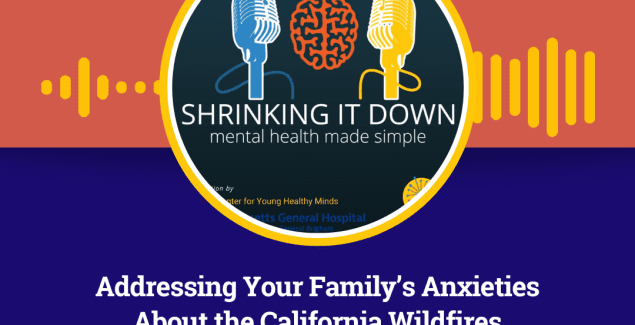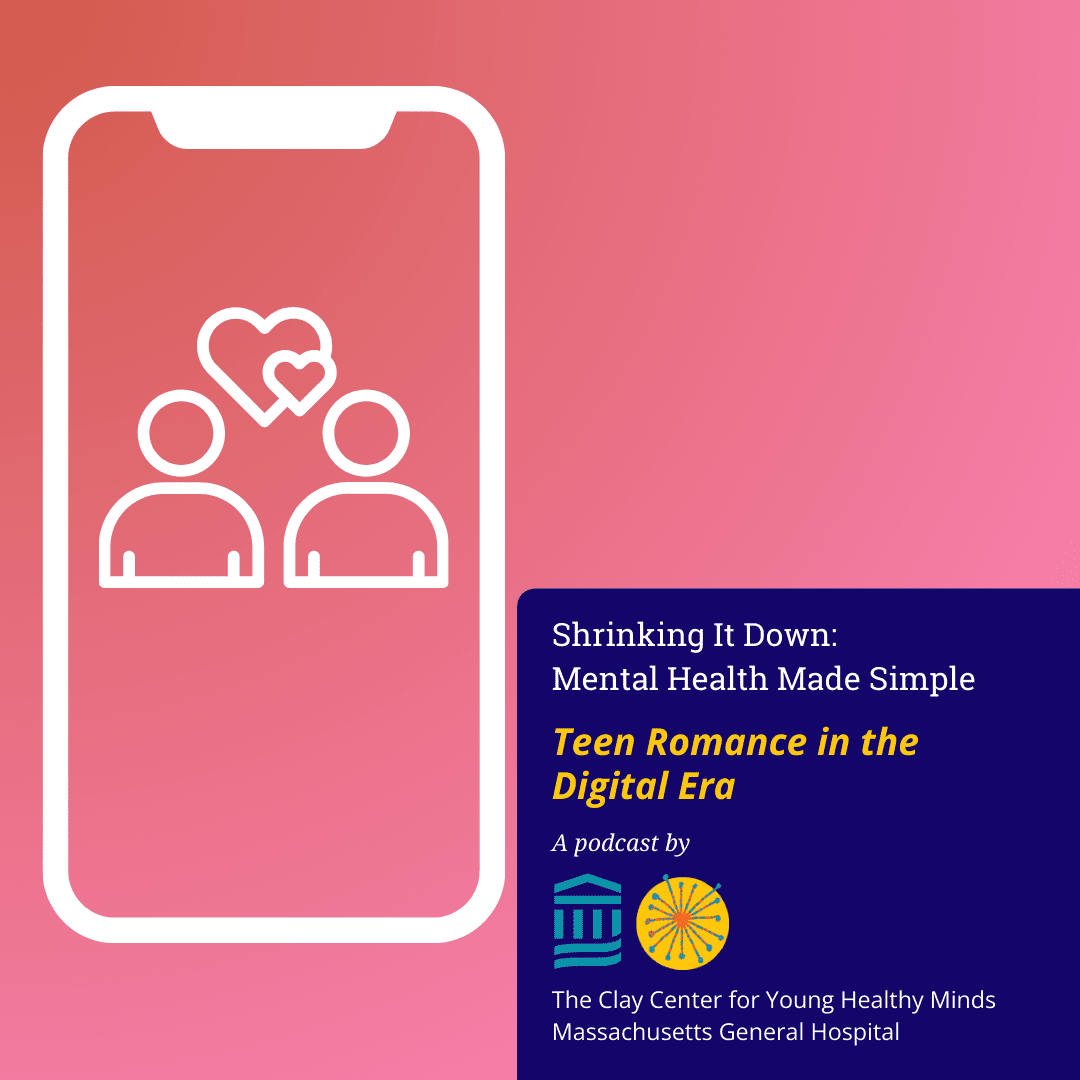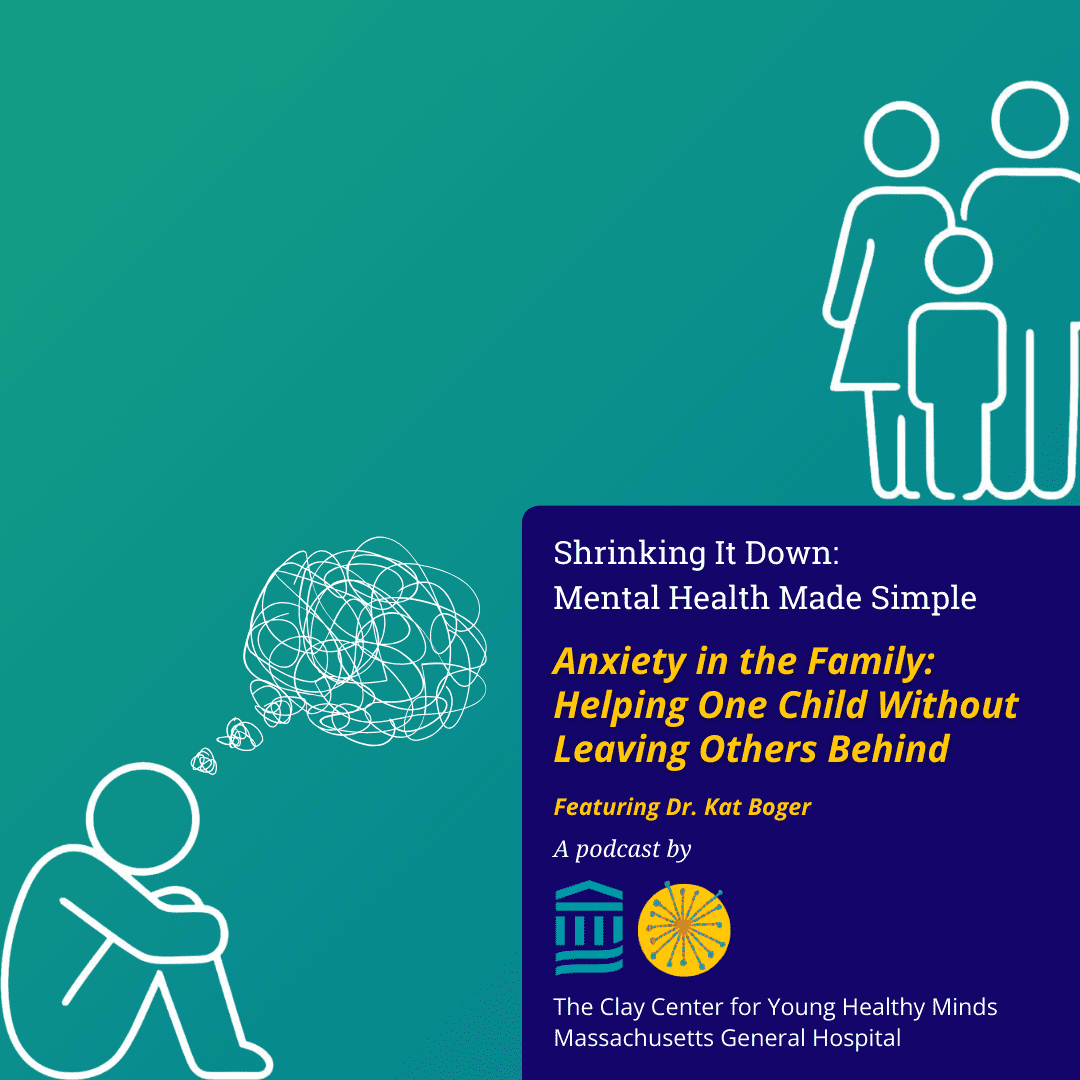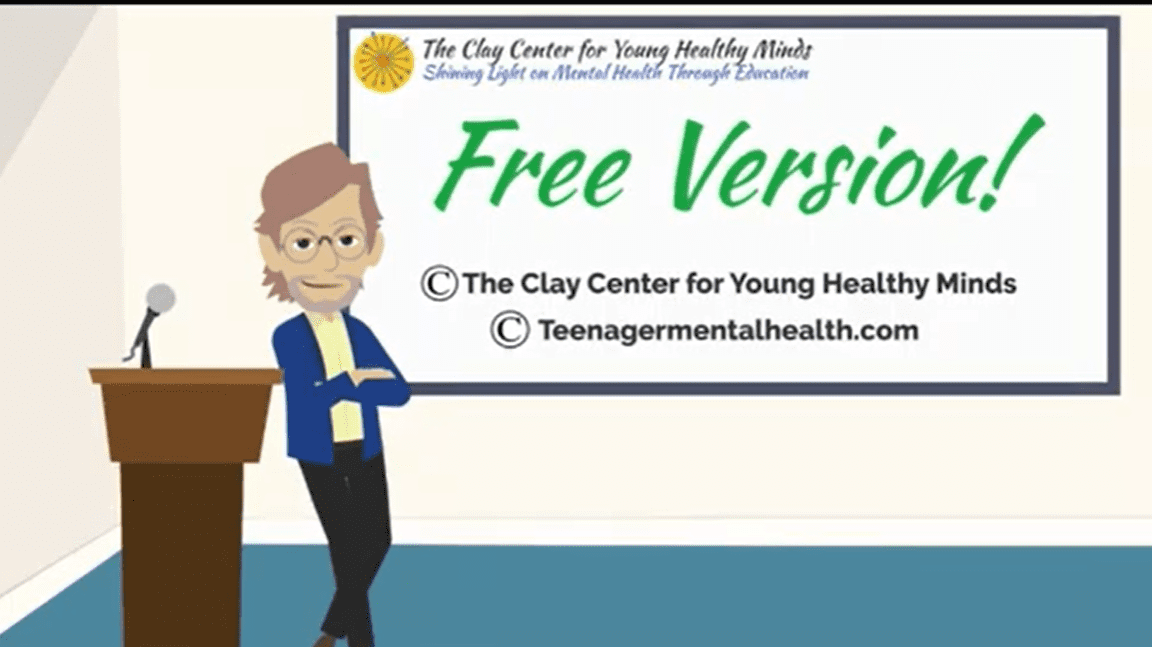Addressing Your Family’s Anxieties about the California Wildfires

Posted in: Hot Topics, Podcast
Topics: Anxiety, Hot Topics
The Palisades Fire has been devastating California since the start of the year, destroying over 23,000 acres and nearly 5,000 structures.
In this special episode of Shrinking it Down, Gene and Khadijah explore the emotional impact of these fires, sharing strategies for parents to help them manage their own and their family’s anxieties about the fires.
Media List
- Palisades Fire (MalibuCity.org)
- California Wildfires Response (Red Cross)
- Breaking News and Kids (MGH Clay Center)
- The Psychological Gift Of Giving A Gift (MGH Clay Center)
- Climate Anxiety and Kids, featuring Elizabeth Pinsky, MD (MGH Clay Center)
- 10 Self-Care Tips for Parents (MGH Clay Center)
Episode Transcript
SPEAKERS: Gene Beresin, MD, MA; Khadijah Booth Watkins, MD, MPH.
[INTRO MUSIC PLAYS]
Gene 00:02
All politics is local, and I think climate change can be much more concrete if we think about it as local. So, for example, what can we do at home to help affect climate change? What can we do in our community? So, what can we do at the state level? What can we do at the level of the nation? You know, we’re in the world.
[INTRO MUSIC ENDS]
Welcome back to Shrinking it Down: Mental Health made simple, I’m Gene Beresin
Khadijah 00:33
And I’m Khadijah Booth Watkins.
Gene 00:35
We’re two child and adolescent psychiatrists at the Clay Center for Young Healthy minds at the Massachusetts General Hospital. And today we’re going to talk about a very timely and devastating issue that’s been affecting California since the seventh of this month, the Palisades fire. But it’s actually beyond the Palisades fire. It’s multiple fires all over the place.
Khadijah 00:58
It is. It is quite devastating. And as of January 21, over 23,000 acres have been burned and nearly 5000 structures destroyed. This fire has just been devastating for so many communities with over 200,000 evacuations across the region. So, families are displaced, homes are lost, and people are really struggling to think about how to rebuild and get back on track.
Gene 01:24
Have you? Have you known anybody out there that’s been that’s been affected by the fires, Khadijah?
Khadijah 01:29
Thankfully, the family that I do have in Los Angeles were really just affected from a smoke standpoint, but you know, they also had to evacuate just to be safe. So, spell don’t know, thankfully, many people, but, you know, people are evacuating to places like Massachusetts and other places where I am, so I am encountering people who have been affected by the fires.
Gene 01:49
Oh, actually, I have, I have a lot of family out there in LA and one of my very best friends, who happens to be a child psychiatrist, has a house in Santa Monica, which was five blocks away from the Palisades fires. So, it was like touch and go, and they were told to evacuate in that neighborhood. Fortunately, her neighborhood survived, but it was, it was touch and go. So, these fires have been in the news, and there’s been they’ve been just devastating and, and the videos released from the communities are just terrifying to watch. So today, what we want to do is help parents navigate these, these rough waters, even though they’re really in a drought state in California, so there’s no there’s not enough water. But most children and teens have been exposed to extensive media coverage of these fires. And how should they talk with them? How should they explain things, and how can they help them? How can they help them alleviate their anxieties, both about California, but also about the possibility about such events that might take place right out here, you know, in in Massachusetts. What do you think?
Khadijah 03:17
Yeah. I mean, these are not easy conversations to have, because there is so much coverage, which you know is it’s good and bad, but they’re conversations that we have to have, because otherwise, kids are going to create their own narrative and stories and make themselves more and more anxious. So, you know, what we always say is, before you think about having any conversations with your children or young people is to really make sure that you are managing your own emotions and anxiety, because they will feed off of us. But you want to start and try to keep it as light as possible, even though this is a really serious topic. But ask them, you know, what they know? How where are they getting their information? Know? What are they specifically worried about? What are their concerns? And allow them to kind of just talk in a more open way, you know, asking them more kind of open-ended questions, listening to what they have to say and how they respond, validating their fears and concerns. Climate change might come up, and it probably will for a lot of kids, because it is, again, another topic of a lot of discussion, but be prepared to kind of answer some of these questions. You also want to make sure you’re paying attention to their what they’re saying, but also what they’re not saying. So, you want to look at the nonverbal cues, like, do they look like they’re distressed? Have you noticed, you know, since this has been going on, that their sleep has been disrupted, their eating patterns are disrupted. Um, they’re maybe more isolated, or their personality seems to just be off or different. Um, you know, you also want to make sure that you are you know kids. Want to know, are they going to be safe? So you want to make sure that you try to assure them as best you can without being false, that people are doing the best they can to make things better for other people, and it can be helpful for a lot of kids who are feeling helpless in this situation, to engage them in some activities or some, in some. Way that they feel like they’re giving back, or they have a sense of purpose and agency. And this can be really helpful for kids, you know, things like, you know, participating in fundraisers, or, you know, donating to the Red Cross. You know, people have been displaced, and they’ve lost a lot, and they need a lot of things. So, this could be helpful for a lot of kids to feel like they’re actually doing something. So, these are some of the things that I think we want to think about when we’re having these conversations with our kids,
Gene 05:22
yeah, and I think one of the things we need to do is remember that kids at different developmental levels understand things differently and talk differently. So, for example, the way you would address, say, a preschooler or a school age kid or a middle school and high school kid or a young adult would be very different. And so just remember that you know preschoolers, and they know about this stuff. They know they sense that something is going on. There’s what they’re catching something on TV or on a smartphone or on a computer. You know they they’re much more attuned to your level of anxiety. So, I think could easy. Your point is well taken about controlling your anxieties, and we can, we can get to that, but they’re going to need a lot more TLC. If they know that you’re anxious, they’re going to need to be screened from the TV. They’re going to need to be screened from conversations school age kids, on the other hand, you know, they are a little more sophisticated, but they see the world in black and white terms very concretely. You know, the good guys and the bad guys, the climate change versus not climate change, fires versus, you know, floods and there. And they work things out largely through play. So, you know, they may want to be playing as first responders or fire firefighters or various kinds of things, and they may do it over and over and over again, which drives some parents kind of crazy. And you might think that they’re kind of like getting more and more anxious, but actually, they’re not. They’re actually working it through, through play, and you might even want to play with them. And adolescents, on the other hand, they’re much more sophisticated. They know perhaps as much, if not more than we do, about climate change and about fires and the aftermath of fires, such as mudslides and such with them. I mean, I would, I would keep media to a very, very limited amount for preschoolers and school aged kids, but for adolescents, you may want to actually watch TV or YouTube or various forms of coverage and stop and ask them what they’re seeing and what they’re feeling, what they’re thinking, and actually help them process this information. So, Khadijah, maybe you could, maybe you could chime in a little bit about that, or about how parents can manage their anxieties?
Khadijah 08:03
Well, I think, I think it is important to talk about how parents can manage their anxieties. We are constantly saying that we have to keep our own kind of emotions and anxieties in check before we kind of approach our kids, because they will feed off of us. So how do we put on our oxygen mask first? Like, what can we do to keep our own fears and anxieties from at base so that they don’t interfere and bleed onto our kids? I mean, what? What are your thoughts about that?
Gene 08:32
Well, I’m glad you we say we’ve used this analogy a lot in these podcasts about, you know, when the flight attendant says, if the pressure drops, put the oxygen mask on yourself first, and then help the person next to you. And it’s so true for working with our kids. I mean, there have been so many research studies and so much evidence that when parents are controlling their anxieties, their emotions, their own fears, it’s extraordinarily important for the kids, but there are other things that parents can do. So, make sure that you have supports, friends, relatives, clergy, neighbors, people you trust. Make sure that your conversations with your own friends and supports and with your kids are short and ongoing. I think another important thing, especially in hard times like this, is spend time together. You know, spend time together with your kids, with your partners, with your neighbors and friends and members of your spiritual communities. You know, consider a game plan if something were to happen in your area, just so that the kids know that, you know, you’re on top of things. And all kids, kids of all ages, want to know. You know, am I safe? Are you the people taking care of me safe? And how is this going to affect the rest of my life? Part of that third component is letting them know that you have a game plan. Should anything happen in our area? And while it may not be wildfires, it may be, you know, a major snowstorm, it may be, you know, a hurricane, but they need to know that they’re game plans. So, Khadijah, should parents attempt to shield their kids from the media coverage? And what do you think about what I was suggesting in terms of media? Because it’s, it’s, it’s, you know, we’re all digital hostages. I’m just looking around my desk right now. I’ve got two smartphones, an iPad, a computer, laptop, and a big screen, you know, I’m surrounded by media, and we all are. So what? What can we? What can we do to limit media exposure? Or should we?
Khadijah 10:50
Well, yeah, well, some of us are, are, are more hostages than others, for sure, but, but I think, I think this is a great question. You kind of answered a lot of this earlier, but I think it really comes down to, you know, parents know their kids best. You know what your kid can and cannot handle. You know what state that they’re in and whether they can take on more information or not. But in general, I think you mentioned with younger kids, we really should be limiting that what they see on TV, limiting their media coverage, because it’s just only going to, you know, give them anxiety that, you know, they’re not really equipped to really process it the way an older kid is. But in addition to limiting their media coverage, like kids are listening, so the conversation that you’re having, maybe with a friend over the phone or a friend in person, you know, be mindful that the kids are around and they’re listening. So, we also want to limit their exposure to those conversations as well. Too much information for kids of this age can really create too many bigger images and stories, and they can get carried away, which can be pretty traumatic for them.
Gene 11:47
And you know, there have been, there have been some media studies that kids as well as adults, but especially children, that can actually develop PTSD Post Traumatic Stress Disorder by watching things on TV. And for example, the classic studies were done with the Challenger disaster, with the Oklahoma City bombings, going back to the Gulf War, which was shot day by day by day by day, the Twin Towers going down. Those are examples of things that that that young people have seen on TV, which have produced post-traumatic stress disorder. So, while the media could be extremely helpful if, if we are judicious about what we actually show and maybe screen it first, but too much can be overwhelming and can actually be destructive for young people.
Khadijah 12:48
And so, to that point, I think you know, as we’re thinking about like adolescents and older kids, could we be shielding them or not? We shouldn’t be shielding them. But I think you know to the point of over, like over, seeing too much on TV can be pretty damaging to us. So, we do want to encourage them to maybe limit their exposure, but we do want to have more of a collaborative conversation with them about what they’re seeing. So, you know, think about going online with them, having them share with you what they’ve seen and what sources that they’re getting their information from, help them to think about how they’re feeling when they’re when they’re viewing these sources, so that they can, you know, again, monitor themselves, helping them to be more self-aware about what they’re feeling and what they’re experiencing, so they can, you know, stop the scrolling, turn the news off and kind of stop having some of these conversation if they’re becoming too upsetting. But we don’t want to shield them from the information if they’re older kids, but, with that, what can parents do when they want to help their children? Because they’re everyone is suffering. But how do we help our children?
Gene 13:49
Well, you know, it’s a great question. I think we can help them in a number of ways. You mentioned previously about giving, about making a contribution to the Red Cross and other agencies. You know, giving is far more powerful to the brain. I mean, all of our kids want to get, get, get, get, get. We all like to be given things. But it turns out that giving is far more powerful from a neurobiological standpoint than receiving, because it releases oxytocin in the brain. And oxytocin is that neurochemical that forms connections, you know, it’s what’s released, kind of like when you cuddle with your dog, or you cuddle with your kids, so they could participate giving. And it could be just donations, or it could be, you know, I mean, after 911 so many of the survivors were given cards and drawings and pictures and, you know, to people who they didn’t really even know. So, sending notes or cards posts that are supportive, you know. And in that respect, one thing that helps kids a lot and helps adults a lot. As well, is using the creative arts for self-expression and to help us, help us manage our thoughts and feelings. And so, you know, whether it’s journaling or drawing or singing or creating playlists listening together, they can be extremely helpful. And another thing is given that humans are pack animals, and we need each other joining groups in your local in your local areas, or even national groups, so that you feel connected and locally, whether it’s your places of worship or community groups, or whether it’s online groups that’s extremely, extremely valuable. So, you know, let me ask you this, Khadijah, is this an appropriate time to talk about climate change? I mean, we’ve done a podcast on climate change, and everybody’s the buzz is that this is, this is, you know, a result of climate change. And it probably is, but when and how should we talk to our kids about it? Should they? Should parents be willing to bring this up and child climate change can be a pretty abstract concept. So how do you how do you make talking about climate change accessible, understandable, and help our kids as well as ourselves, uh, tolerated.
Khadijah 16:40
You know, it’s rarely ever too early or the wrong time to be having conversations with our kids, because if we’re even thinking about having conversations with them about something, they’re thinking about it. And so, I think it really just boils down to having these conversations in a developmentally appropriate way. So, we want to tailor the conversation, you know, to a school aged kid, which would be different than we would talk about it with our teenagers and our young adults, you maybe want to think about just hearing from them first. What? What do they know about climate change? What are they talking about? Like? How are they talking about this in school or amongst their friends? We can’t really address their concerns if we don’t really even know what, what they’re thinking and what they know. So, I think it starts there, having that conversation about hearing from them about what they know outside of that you know, you want to, you want to kind of address their concerns. So, asking them again, what, what worries do they have, helping them to think about how climate change just affects them. Because I think, like you said earlier, kids want to know, you know, are they going to be safe, and how this is going to affect them, and what are the people around them doing to protect them? And so those are the things that I think you really want to think about and start with. When you’re having these conversations about climate change with your kids, it can feel pretty abstract, but really, if we help them think about it, we can really make it a little bit more concrete for them, so they can kind of really, kind of understand about climate change, and maybe even, you know, like we talked about earlier with some of the older kids, go online with them, like do some research together and share information, make it a more collaborative process. And I think that way it could be more meaningful for all parties involved.
Gene 18:16
And, you know, I think, I think, you know, just as all politics, I think Tip O’Neill said this way back, all politics is local, and I think climate change can be much more concrete if we think about it at local. So, for example, what can we do at home to help affect climate change? You know, can we conserve water? Can we collect water, you know, to use for gardening, and that way we can save our water tables in case they’re fires. What can we do in our community? How can we, kind of, like, you know, help plant trees in our arboretums, you know, to kind of create more, you know, you know, to collect the green gasses, you know. So, what can we do at the state level? What can we do at the level of the nation, you know, in the world? I mean, you know, I won’t get into politics now, but this administration does not seem to be as friendly to climate change as others. And I think, you know what I’ve heard from a lot of, a lot of kids and parents that I’ve, I’ve talked with about the new administration, is that it’s, it actually is pretty scary. I mean, I have never heard more concerns about what could happen, you know, in this, in this, you know, crisis situation that we’re in right now. And what can we do to help offset even major political forces that are being encouraged to you know, drill to use more coal to create. Things that could actually worsen climate change. It’s, it’s, it’s, it’s complicated. And I think the most important thing is that we all can do, we all can do things individually and in families, in our own communities, that can, can make it, can make, make a difference. So, it’s not that abstract. So how can we, what do you think? How can we empower our kids to make a difference with climate change?
Khadijah 20:29
I mean, I think it goes back to just kind of how you listed some of the ways that they can, you know, impact climate change on a personal level, where they’re talking about what you could do at home, to be to conserve, how you can kind of address these things on a more community and state level. So, I think that’s really helpful. But there are other ways that they can feel empowered. You know, they can think about, you know, joining groups that kind of have similar kind of ideas and visions, so that they can have a group of people that they can feel supported by and share and bounce ideas off of. This can happen, you know, in the community. Can happen in places of worship. Sometimes they can even have some of these groups in school and online. But there are also ways to use creative arts to generate, you know, thoughts and feelings and to help you kind of process what’s going on with climate change. And so those are some kind of ideas. And I know you talk a lot about using the creative arts, but this is another place where we can kind of really use creative arts to feel more empowered and express kind of our feelings and concerns about climate change. So, to wrap up, let me ask, as many of us are anxious and worried about friends and families and communities in California, what is something that you do to calm yourself in this anxiety bit situation, and does this help you deal with your children?
Gene 21:43
Well, I’ll take a shot at it, and then I’d like you to answer that. Well, since my four kids are grown and have their own kids, and I’ve got nine grandchildren, the good news for me is that all of my kids are extraordinarily concerned about climate, and actually they do quite a bit to kind of enlighten and help and help their kids deal with and cope with it. I think one thing is to cope with it directly, and that is to be aware of what’s going on, to garden, to, you know, grow our own vegetables and do whatever we can to conserve, conserve our water and promote, you know, a greener planet. But you know, there are other things you know. So, for example, for me, sometimes I need to do something entirely different. I mean, you know, for me, just sitting at the piano and playing is, is revitalizing. I mean, I mean, I, you know, I can only I’m a news junkie. I admit it, it’s hard for me to stay away from it. It’s hard for me not to be worried and upset and anxious about it, but I’ve got to kind of like do things that kind of take me to a different level of anxiety reduction. And for me, I think the most valuable thing is, is, just playing the piano and playing with my friends. So that’s what I do to kind of like, relax. How about you?
Khadijah 23:32
So, I really take seriously the idea of being informed but not having too much. So, I really have limited the amount of time I’m spending watching the news because it really is on a loop, so I really don’t need to see it over and over again. So, I really kind of being proactive about that. But the other things that I do are, I guess, similar to you, I try to engage in activities that are unrelated. So I’ve been doing a lot more reading and listening to audiobooks and then trying to do more of connecting with my friends and family, especially people who are out there in California, just checking in and connecting with them, and just really, just taking time and just thinking about pleasurable things,
[OUTRO MUSIC PLAYS]
like, you know, where I want to go on vacation, like, kind of fantasizing about, you know, what places I haven’t gone. So just kind of some things to just take my mind completely off of what’s going on, to kind of get me back grounded. And I think that does help me with my kids, because then I can encourage them to do, maybe not the same thing that I’m doing. But what would help you feel grounded and maybe distracted or a little bit more at ease with what’s going on.
Gene 24:40
That’s great so and for those of you at home, if you like what you’ve heard today, consider leaving us a review. And as always, we hope that our conversation will help you have yours. I’m Gene Beresin
Khadijah 24:56
and I’m Khadijah booth Watkins, until next time.
[OUTRO MUSIC ENDS]
Episode music by Gene Beresin
Episode produced by Spenser Egnatz


 Share
Share Tweet
Tweet






